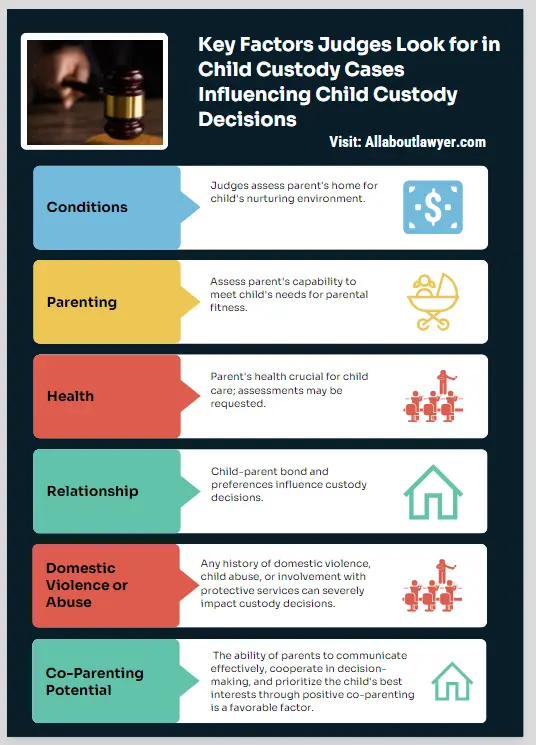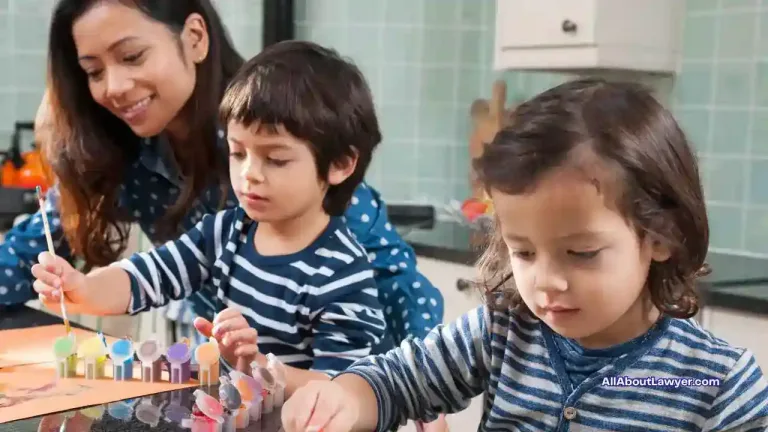What do judges look for in child custody cases Factors in Child Custody Decisions
Handling child custody cases can be an emotional and complex journey for parents. It’s important to know what judges look for in child custody cases and what they put first. It increases the chances of securing a favorable outcome that protects your child’s well-being.
By grasping the judge’s perspective, you can make informed decisions and effectively present your situation in the best interests of your child.
Table of Contents
The Paramount Principle: The Child’s Best Interests
At the heart of every child custody decision lies the fundamental principle of the child’s best interests. Judges are legally obligated to prioritize the child’s overall well-being, ensuring they have a safe, stable, and nurturing environment to thrive physically and emotionally. This core principle serves as the lens through which all other factors are evaluated.
Key Factors Judges Look for in Child Custody Cases Influencing Child Custody Decisions
1. Living Conditions and Stability
Judges closely examine the living conditions and stability offered by each parent’s home environment. They evaluate factors such as the safety and security of the housing situation, the suitability of the neighborhood for raising a child, and the consistency of established parenting routines. Providing a safe, secure, and stable home is essential for promoting the child’s best interests.

2. Parenting Ability and Capacity
The ability of each parent to meet the diverse needs of the child, both physical and emotional, is carefully assessed. Judges consider factors such as the parent’s capacity to provide healthcare, education, emotional support, and age-appropriate discipline. Demonstrating parental fitness and a commitment to prioritizing the child’s needs can positively influence custody decisions.
Related Articles For You:
Facing Child Custody? Questions to ask a custody lawyer during consultation
What Can Be Used Against You in Child Custody Battles?
3. Mental and Physical Health of Parents
A parent’s mental and physical health is taken into account, particularly if it impacts their ability to care for the child responsibly. Judges may request documentation or evaluations to assess any concerns related to mental health stability, substance abuse issues, or chronic illnesses that could affect parenting capacity. Appropriate treatment and management of health concerns can be advantageous.
4. The Child’s Relationship with Each Parent
The existing emotional bond between the child and each parent is a significant factor in custody determinations. Judges also consider the child’s preference if they are of an age where their opinion can be given appropriate weight. A positive relationship and strong emotional connection with a parent can be beneficial in custody proceedings.
5. History of Domestic Violence or Abuse
Any history of domestic violence, child abuse, or involvement with protective services can severely impact custody decisions. Judges prioritize the child’s safety and well-being above all else, and a documented history of abuse or violence can be a significant deterrent in granting custody or visitation rights.
6. Co-Parenting Potential and Communication
The ability of parents to communicate effectively, cooperate in decision-making, and prioritize the child’s best interests through positive co-parenting is a favorable factor. Judges appreciate parents who can set aside differences and work together for the child’s benefit, promoting a healthy co-parenting relationship.
Additional Considerations What do judges look for in child custody cases
- The child’s age and developmental needs (child development and child custody)
- Each parent’s financial stability (financial stability and child custody)
- The child’s existing childcare arrangements (existing childcare and child custody)
- History of adherence to parenting plans (if applicable) (parenting plan compliance and child custody) And How to file without a Lawyer.

Building a Strong Case | The Role of Legal Representation
Navigating the legal complexities of a child custody case can be challenging. Consulting with an experienced child custody attorney is highly recommended to ensure your rights are protected and to guide you through the process effectively. An attorney can help you understand the specific requirements, present a compelling case tailored to your situation, and advocate for your child’s best interests.
Conclusion
Understanding the factors that influence child custody decisions empowers you to make informed choices throughout the legal process. Remember, the child’s best interests are the top priority for the court.
FAQs
Why do judges prioritize the child’s best interests in custody cases?
The overarching principle in child custody decisions is to ensure the child’s physical and emotional well-being in a stable and nurturing environment. Judges are legally obligated to prioritize the child’s best interests above all other considerations.
What factors might affect a parent’s ability to gain custody?
A history of mental health issues, substance abuse, unstable living conditions, domestic violence, or child abuse can negatively impact a parent’s chances of gaining custody. Judges aim to provide a safe and secure environment for the child, and these factors may raise concerns about a parent’s ability to do so.
How does a judge determine the child’s best interests?
Judges consider various factors when determining the child’s best interests, including the child’s relationship with each parent, the child’s age and developmental needs, the stability of each parent’s living situation, and the ability to provide a nurturing environment. They also evaluate the potential for positive co-parenting and communication between the parents.
Is it always necessary to have a lawyer in a child custody case?
While legal representation is not mandatory in child custody cases, consulting with an experienced child custody attorney is highly recommended. An attorney can ensure your rights are protected, guide you through the legal process, and help you effectively present your case in the best interests of your child.
What should I do to prepare for a child custody hearing?
Why do judges prioritize the child’s best interests in custody cases?
The overarching principle in child custody decisions is to ensure the child’s physical and emotional well-being in a stable and nurturing environment. Judges are legally obligated to prioritize the child’s best interests above all other considerations.
By understanding the key factors that influence child custody decisions and seeking legal guidance, parents can navigate this complex process with confidence, increasing their chances of achieving a favorable outcome that prioritizes their child’s well-being.
About the Author

Sarah Klein, JD, is a former family law attorney with over a decade of courtroom and mediation experience. She has represented clients in divorce, custody cases, adoption, Alimony, and domestic violence cases across multiple U.S. jurisdictions.
At All About Lawyer, Sarah now uses her deep legal background to create easy-to-understand guides that help families navigate the legal system with clarity and confidence.
Every article is based on her real-world legal experience and reviewed to reflect current laws.
Read more about Sarah
